译林牛津版高中英语模块八Unit1 The written world Grammar and usage课件(共51张PPT)
文档属性
| 名称 | 译林牛津版高中英语模块八Unit1 The written world Grammar and usage课件(共51张PPT) |
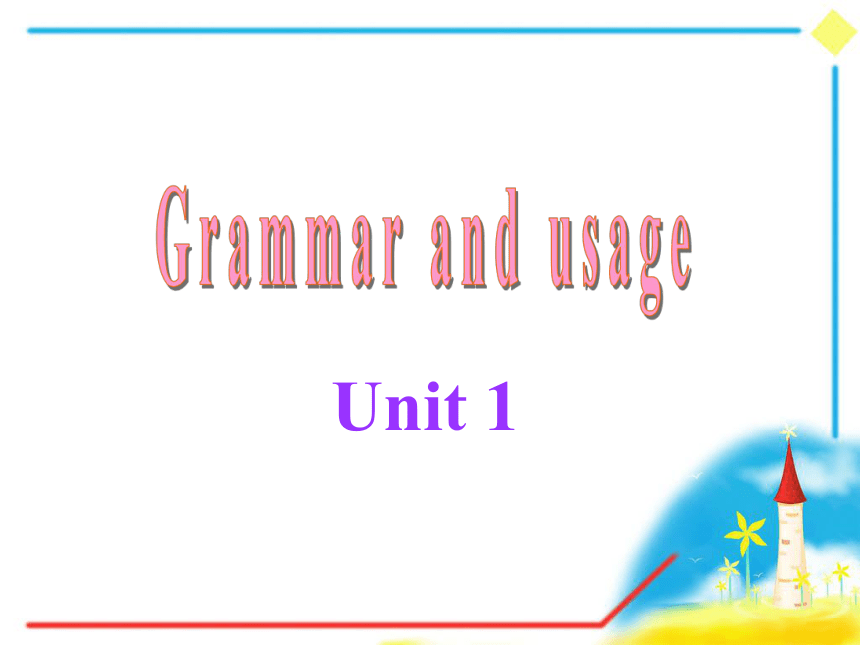
|
|
| 格式 | zip | ||
| 文件大小 | 411.2KB | ||
| 资源类型 | 教案 | ||
| 版本资源 | 牛津译林版 | ||
| 科目 | 英语 | ||
| 更新时间 | 2019-06-26 16:28:05 | ||
图片预览

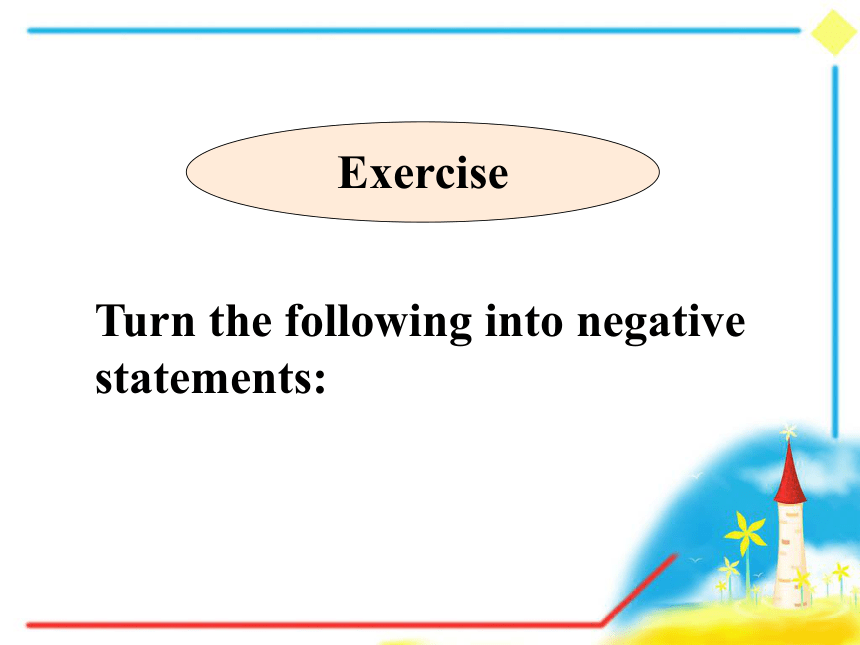
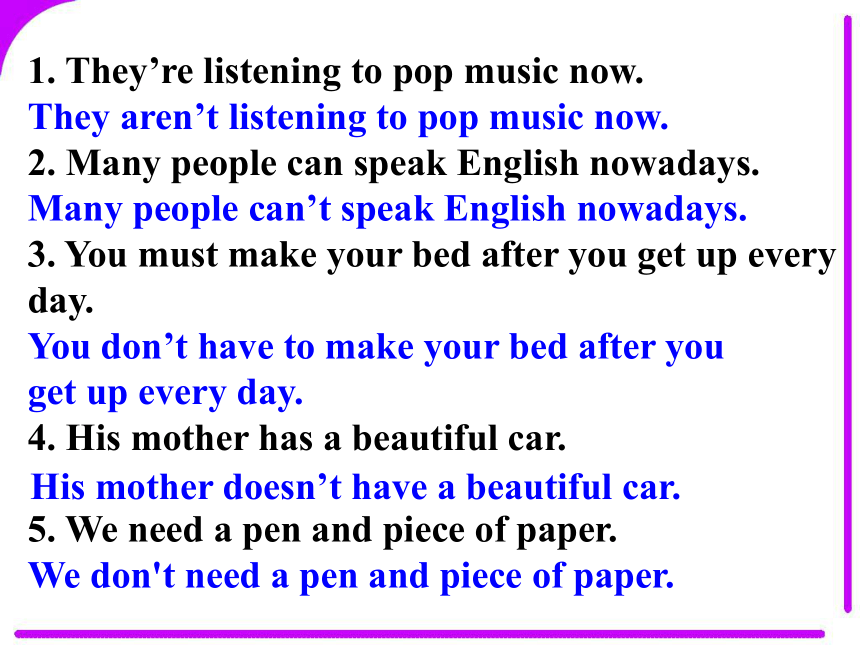
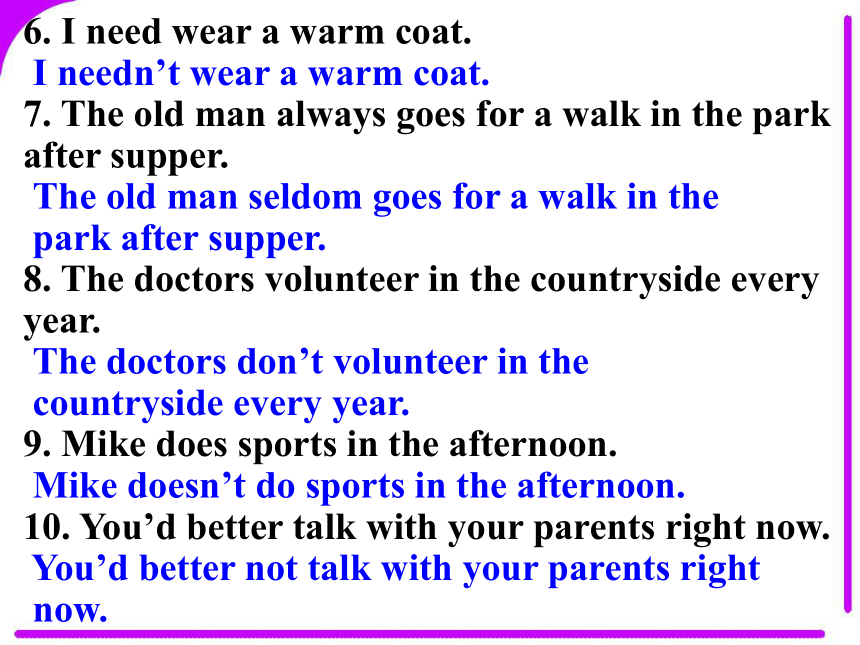
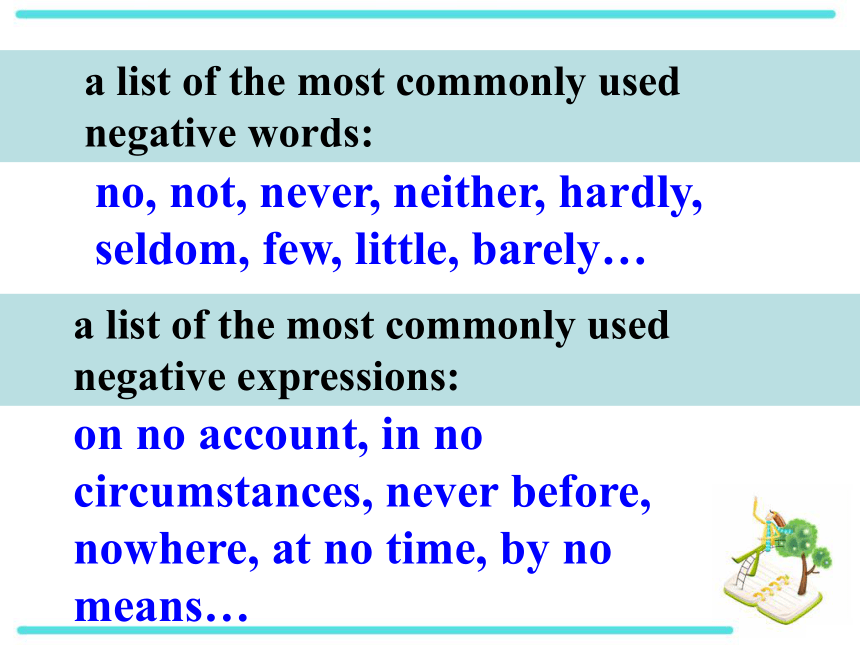
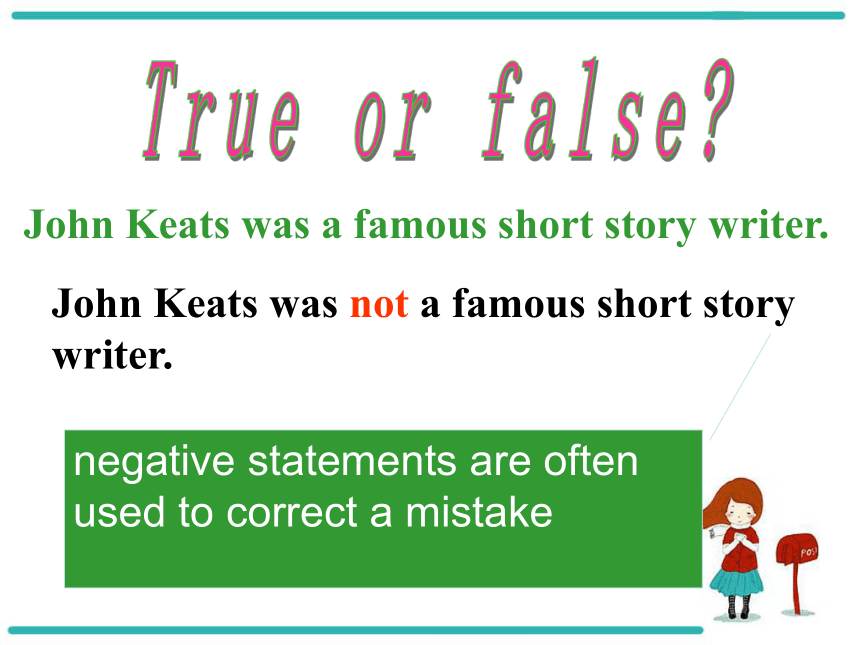
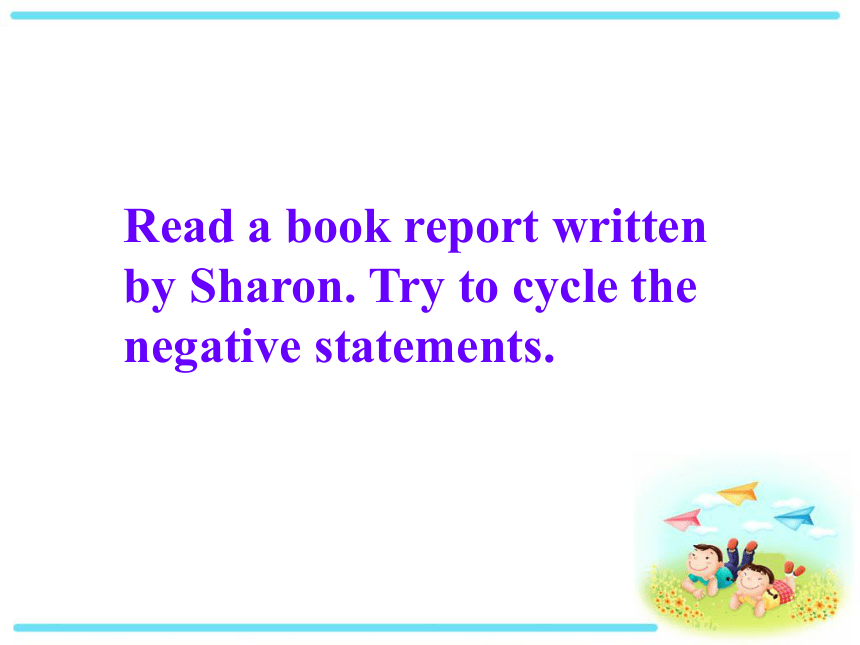
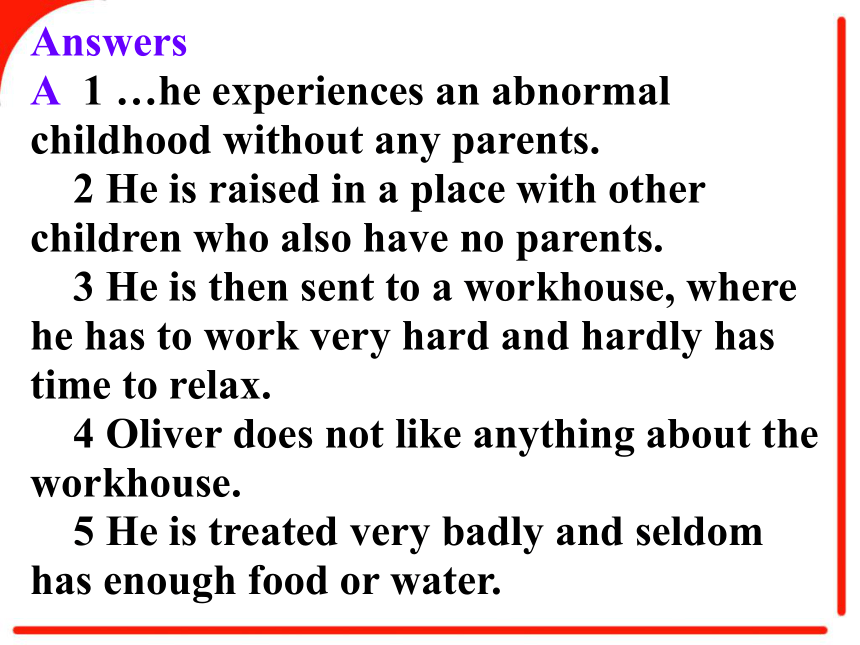
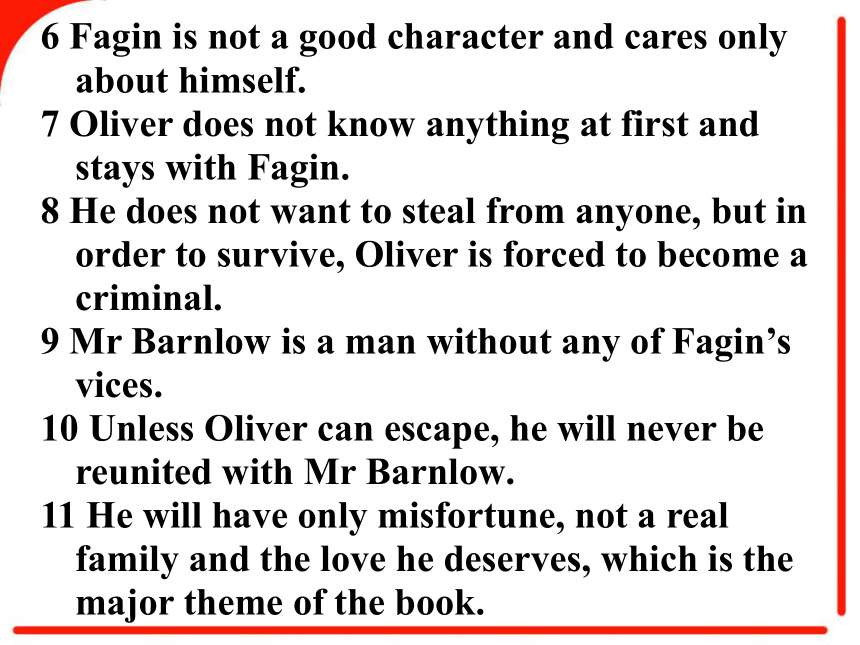
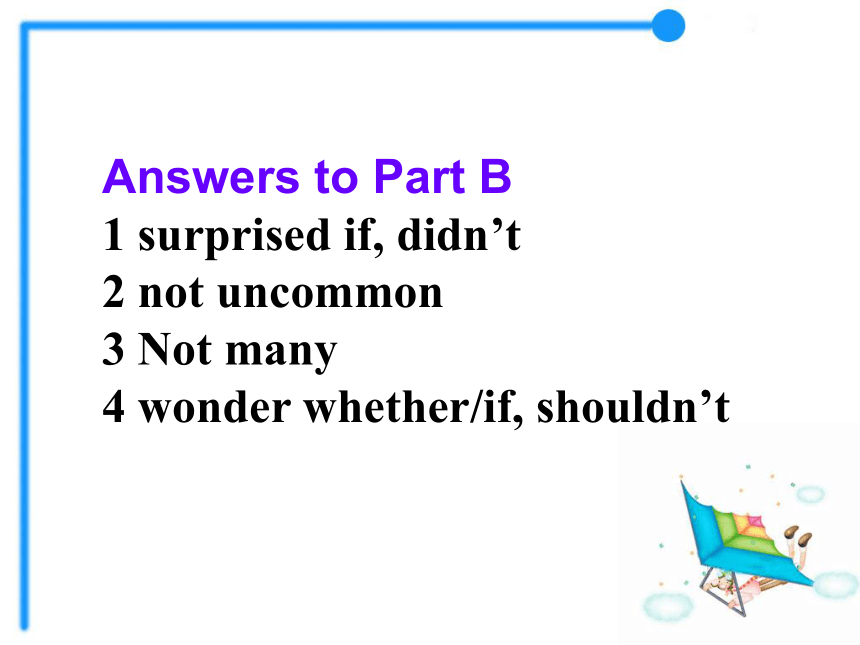
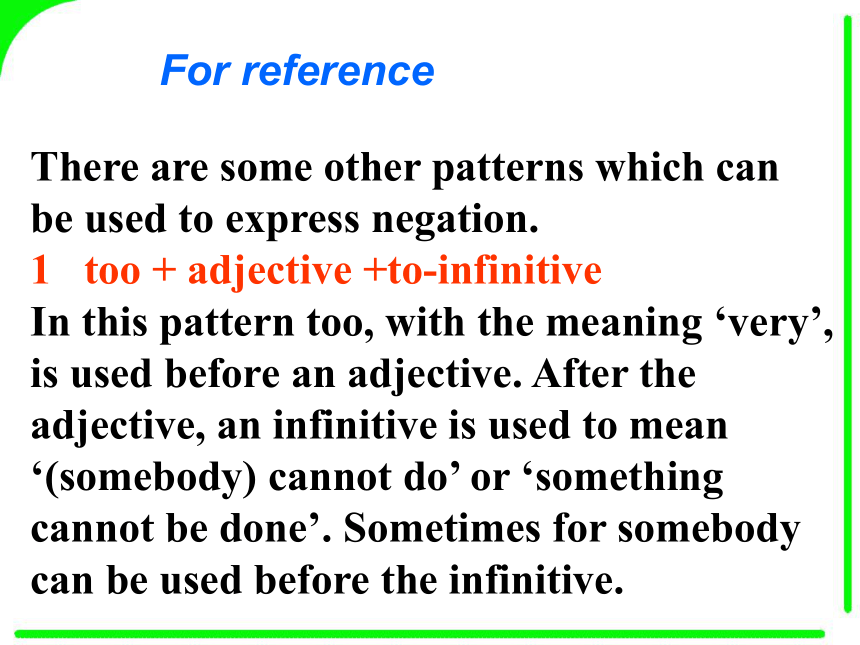
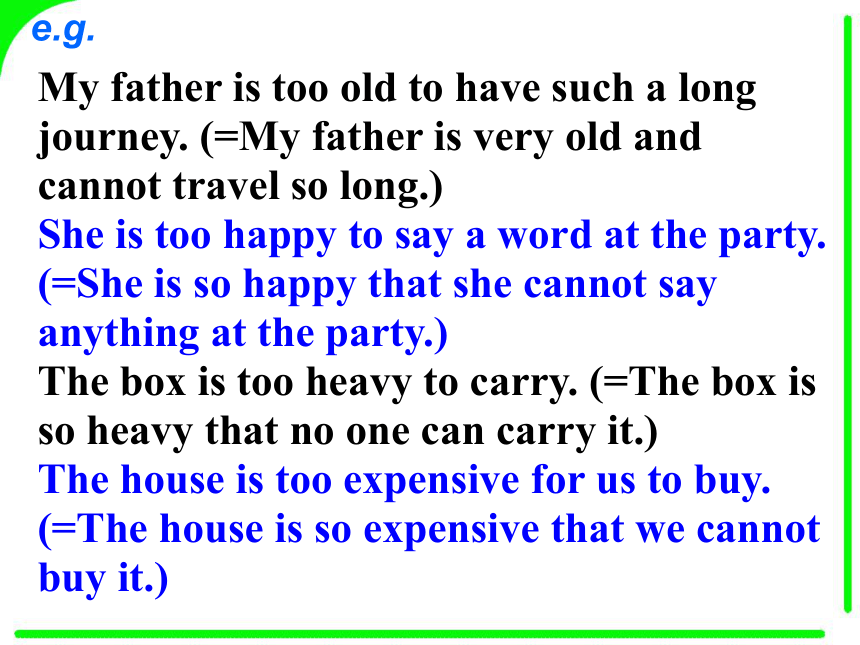
文档简介
课件51张PPT。Grammar and usageUnit 1Turn the following into negative statements:Exercise1. They’re listening to pop music now.
They aren’t listening to pop music now.
2. Many people can speak English nowadays.
Many people can’t speak English nowadays.
3. You must make your bed after you get up every
day.
You don’t have to make your bed after you
get up every day.
4. His mother has a beautiful car.
5. We need a pen and piece of paper.
We don't need a pen and piece of paper. His mother doesn’t have a beautiful car.6. I need wear a warm coat.
I needn’t wear a warm coat.
7. The old man always goes for a walk in the park after supper.
The old man seldom goes for a walk in the
park after supper.
8. The doctors volunteer in the countryside every year.
The doctors don’t volunteer in the
countryside every year.
9. Mike does sports in the afternoon.
Mike doesn’t do sports in the afternoon.
10. You’d better talk with your parents right now.
You’d better not talk with your parents right
now. a list of the most commonly used
negative words:no, not, never, neither, hardly, seldom, few, little, barely… a list of the most commonly used
negative expressions:on no account, in no circumstances, never before, nowhere, at no time, by no means…True or false? John Keats was a famous short story writer. John Keats was not a famous short story writer.negative statements are often used to correct a mistake Read a book report written by Sharon. Try to cycle the negative statements.Answers
A 1 …he experiences an abnormal childhood without any parents.
2 He is raised in a place with other children who also have no parents.
3 He is then sent to a workhouse, where he has to work very hard and hardly has time to relax.
4 Oliver does not like anything about the workhouse.
5 He is treated very badly and seldom has enough food or water.
6 Fagin is not a good character and cares only about himself.
7 Oliver does not know anything at first and stays with Fagin.
8 He does not want to steal from anyone, but in order to survive, Oliver is forced to become a criminal.
9 Mr Barnlow is a man without any of Fagin’s vices.
10 Unless Oliver can escape, he will never be reunited with Mr Barnlow.
11 He will have only misfortune, not a real family and the love he deserves, which is the major theme of the book. Answers to Part B
1 surprised if, didn’t
2 not uncommon
3 Not many
4 wonder whether/if, shouldn’t For reference
There are some other patterns which can be used to express negation.
1 too + adjective +to-infinitive
In this pattern too, with the meaning ‘very’, is used before an adjective. After the adjective, an infinitive is used to mean ‘(somebody) cannot do’ or ‘something cannot be done’. Sometimes for somebody can be used before the infinitive. e.g.
My father is too old to have such a long journey. (=My father is very old and cannot travel so long.)
She is too happy to say a word at the party. (=She is so happy that she cannot say anything at the party.)
The box is too heavy to carry. (=The box is so heavy that no one can carry it.)
The house is too expensive for us to buy. (=The house is so expensive that we cannot buy it.)
2 few + a countable noun; little +an uncountable noun
When we use few to modify a countable noun, we mean ‘not many’, and the noun should be in its plural form. When we use little to modify an uncountable noun, we mean ‘not much’. And few or little here has the negative meaning. e.g.
Few students in our class have ever read Katherine Mansfield’s short stories. (=Not many/Only one or two students in our class have ever read Katherine Mansfield's short stories.)
We have little rain all this summer. (=It almost does not rain during this summer.)
Because few or little has the negative meaning, we do not use the negative form in question tags.
e.g.
Few people liked his painting at that time, did they?
There is little ink in the bottle, is there? Consolidation 1. [2008 全国II] If Joe’s wife won’t go to the party, ____.
A. he will either B. neither will he
C. he neither will D. either he will
2. [2007 福建]
—Do you need any help, Lucy?
—Yes, The job is I could do myself.
A. less than B. more than
C. no more than D. not more than I. Multiple choice3. His mother had talked to him for many minutes while he was watching TV, but ____. A. a little did he hear B. little did he hear C. little heard he D. a little heard he 4. During the war, ____but also he lost his wife and his child. A. not was his job in the lab taken away
B. not only was his job in the lab taken away C. not merely his job in the lab was taken away
D. not just was taken away his job in the lab 5. I think this is the first time that we have met. ___anywhere. A. Before have we never seen each other
B. Never before we have seen each other C. Each other have we seen never before
D. Never before have we seen each other 6. — The old man wouldn’t stay at home for a rest even if it rained. — ____. He would feel sick if he stayed home for one day. A. So would my grandpa
B. So wouldn’t my grandpa C. Neither would my grandpa
D. Nor wouldn’t my grandpa 7. By no means ___ to our plan for the trip. A. will she agree B. she will agree
C. agrees she D. will agree she 8. They went into a small house but _____. A. no persons did they find
B. not a person found they C. not a person did they find
D. not a person they found 9. Henry often helps look after Granny Wang, but___. A. seldom is George
B. seldom George does C. seldom does George
D. seldom looks George after Granny Wang 10. Nothing but two ancient Chinese coins ______ after they took out the jar. A. did they find in it B. they found in it
C. in it did they find D. in it found they II. Translation
1. 这两本书都不是英国出版的。 2. 你们当中我一个也不认识。3. 我不同意所有这些方案。1. Neither of the books is published in England.
2. I know none of you.
3. I agree to none of these plans. 4. We had finished all the work before he came.
5. How imperfect the rules and regulations are!
6. Nobody can come in without permission. 4. 在他还没来之前,我们就把所有的工作都做完了。
5. 这些规章制度多不完善!
6. 未经允许,任何人不得入内。7. 听到这个消息后,没有一个人不感到惊奇。
8. 人们直到失去了健康才知道健康的可贵。
9. 直到五月的一个星期六下午,玛格丽特才安排我与她姐姐见面。7. Having heard the news, everybody felt
surprised.
There was nobody who did not feel surprised.
There was nobody but felt surprised.
8. People do not know the blessing of health until they lose it.
9. It was not until a Saturday afternoon in May that Margaret could arrange for me to meet her elder sister.10. 不久他就告诉了我们这件事。
11. 对他的成绩我们怎么赞扬也不过分。
12. 他刚进办公室,电话铃就响了。10. It wasn’t long before he told us about this affair.
11. We can hardly praise his achievement too much.
12. No sooner had he entered the office than the telephone rang.13. 只有傻瓜才会做这种事情。
14. 她是班里最自私的了。
15. 他的失败完全是由于他自己的粗心大意。13. None but a fool would do such a thing.
14. Nobody is more selfish than her in the class.
15. His failure was due to nothing else than his own carelessness. Language points1. serve (P8)
verb [T] in a shop, restaurant or hotel, to deal with a customer by taking their order, showing or selling them goods etc: 服务,接待
Are you being served, madam?
That’s the restaurant where they refused to serve Giles because he was so rude.
to provide food or drinks: 提供食物,饮料等
Do they serve meals in the bar?
All recipes in this book, unless otherwise stated, will serve (= be enough for) 4 to 5 people.verb [T] to provide with something that is needed: 提供所需之物
London’s hospitals, so says the report, are out of touch with the communities that they serve.
to work for; to do your duty to: 服务,工作,服役
He served in the army in India for twenty years.
She has served on the committee for the last fifteen years.
He served under Harold Wilson as Transport Minister. service ? noun [U] the act of dealing with a customer in a shop, restaurant or hotel by taking their order, showing or selling them goods, etc: 服务,接待
The only trouble with this café is that the service is so slow.
[C] a system or organization that provides for a basic public need: 公用事业
the ambulance/health/postal/prison service. servant ?? noun public servant/servant of the state
a person who works for the government:公务员
Public servants should be incorruptible.
in service in use: The battleship has been in service since 1965.2. raise (P9)
verb [T] 1) to take care of a person, or an animal or plant, until they are completely grown: 抚养
Her parents died when she was a baby and she was raised by her grandparents.
The farmer raises (= breeds) chickens and pigs.
The soil around here isn't good enough for raising (= growing) crops.
2) to cause something to increase or become bigger, better, higher, etc: 抬高, 提高
I had to raise my voice (= speak more loudly) to make myself heard over the noise.
Our little chat has raised my spirits (= made me feel happier).
3) to lift something to a higher position: 举起
Would all those in favor please raise their hands?3. abuse (P9)
verb [T] to use or treat someone or something wrongly or badly, especially in a way that is to your own advantage: 虐待
She is continually abusing her position/authority by getting other people to do things for her.
to speak to someone rudely or cruelly: 辱骂
The crowd started abusing him after he failed to save a goal. noun [U] rude and offensive words said to another person: 辱骂
He hurled (a stream/torrent of) abuse at her (= He said a lot of rude and offensive things to her).
child abuse noun [U] when adults intentionally treat children in a cruel or violent way 虐待儿童
4. get caught (P9)
verb [L + past participle] getting, got, got or US gotten
sometimes used instead of ‘be’ to form the passive:
I got shouted at by some idiot for walking past his house.
They’re getting married later this year.
This window seems to have got broken.1.
I got caught in the rain and my suit____.
has ruined B. had ruined
C. has been ruined D. had been ruined
2.
-_______ David and Vicky _______married?
-For about three years.
A.How long were … being
B.How long have … got
C.How long have … been
D.How long did … get
高考链接
3.
— How are the team playing?
— They're playing well, but one of them _______ hurt.
A. got B. gets C. are D. were
4.
As we joined the big crowd I got ______ from my friends.
A. separated B. spared C. lost D. missed
高考链接5. pressure (P9)
press verb [I or T; usually + adverb or preposition] to push something firmly, often without causing it to move permanently further away from you: 按,压
Press the button to start the machine.
He pressed his face against the window.
Can you press a bit harder on my shoulders, please?
The crowd pressed against the locked doors trying to get into the building.[T] to make clothes smooth by ironing them: 熨烫
I’ll just press these trousers.
[T] to put a weight on fruit in order to remove the juice: 榨汁
to press grapes
[T] to make a record or CD: 制唱片
Over 3000 copies of the CD were pressed and sent some out to college radio stations.
[T] to make something flat and firm by putting it under something heavy: 压扁
The children pressed some flowers. to try hard to persuade someone to do something: 强迫,迫使
[+ object + to infinitive] The committee pressed him to reveal more information.
He’s pressing me for an answer.
Can I press you further on (= persuade you to say more about) this issue? noun [C usually singular] a firm push against something using the fingers: 按,压
To start the machine, just give this button a press.
[S] when you make cloth smooth with an iron: 熨烫
Can you give this shirt a quick press?
[C] a piece of equipment which is used to put weight on something in order to crush it, remove liquid from it or to make it flat:
a garlic/trouser/wine press ?? noun [U] the force you produce when you press something: 压力
He put too much pressure on the door handle and it snapped.
You can stop bleeding by applying
pressure close to the injured area. pressurepressure ?? noun [C or U] the force that a liquid or gas produces when it presses against an area: 水压,气压
gas/water pressure
The new material allows the company to make gas pipes which withstand higher pressures.
The gas is stored under pressure (= in a container which keeps it at a higher pressure than it would usually have).[U] when someone tries to make someone else do sth. by arguing, persuading, etc: 压力(抽象)
public/political pressure
Teachers are under increasing pressure to work longer hours.
[+ to infinitive] Pressure to abandon the new motorway is increasing.
She’s putting pressure on him (= trying to persuade him) to get married.
Be nice to him—he’s been under a lot of pressure recently.Life is tough in the city. In order to lose their ______, some people drink alcohol.
A. temper B. mood
C. consciousness D. pressures
高考链接6. threat (P9)
noun [C] a suggestion that something unpleasant or violent will happen, especially if a particular action or order is not followed: 威胁
[+ to infinitive] She carried out her threat to throw away any clothes that were left on the floor.
Drunken drivers pose a serious threat (= cause a lot of harm) to other road users.
be under threat of sth. to be in a situation where people are threatening you with something bad or unpleasant: 在……的威胁之下
She left the country under threat of arrest if she returned.[T] to tell someone that you will kill or hurt them, or cause problems for them if they do not do what you want: 威胁
They threatened the shopkeeper with a gun.
[+ to infinitive] They threatened to kill him unless he did as they asked.threatenverb [I] If something bad threatens to happen, it is likely to happen: 预兆,征兆
Look at those clouds! There’s a storm threatening.
[T] to be likely to cause harm or damage to something or someone: 对……造成威胁
Changing patterns of agriculture are threatening the countryside.
Her brother _____ to leave her in the dark room alone when she disobeyed his order.
A. declared B. threatened
C. warned D. exclaimed
高考链接
They aren’t listening to pop music now.
2. Many people can speak English nowadays.
Many people can’t speak English nowadays.
3. You must make your bed after you get up every
day.
You don’t have to make your bed after you
get up every day.
4. His mother has a beautiful car.
5. We need a pen and piece of paper.
We don't need a pen and piece of paper. His mother doesn’t have a beautiful car.6. I need wear a warm coat.
I needn’t wear a warm coat.
7. The old man always goes for a walk in the park after supper.
The old man seldom goes for a walk in the
park after supper.
8. The doctors volunteer in the countryside every year.
The doctors don’t volunteer in the
countryside every year.
9. Mike does sports in the afternoon.
Mike doesn’t do sports in the afternoon.
10. You’d better talk with your parents right now.
You’d better not talk with your parents right
now. a list of the most commonly used
negative words:no, not, never, neither, hardly, seldom, few, little, barely… a list of the most commonly used
negative expressions:on no account, in no circumstances, never before, nowhere, at no time, by no means…True or false? John Keats was a famous short story writer. John Keats was not a famous short story writer.negative statements are often used to correct a mistake Read a book report written by Sharon. Try to cycle the negative statements.Answers
A 1 …he experiences an abnormal childhood without any parents.
2 He is raised in a place with other children who also have no parents.
3 He is then sent to a workhouse, where he has to work very hard and hardly has time to relax.
4 Oliver does not like anything about the workhouse.
5 He is treated very badly and seldom has enough food or water.
6 Fagin is not a good character and cares only about himself.
7 Oliver does not know anything at first and stays with Fagin.
8 He does not want to steal from anyone, but in order to survive, Oliver is forced to become a criminal.
9 Mr Barnlow is a man without any of Fagin’s vices.
10 Unless Oliver can escape, he will never be reunited with Mr Barnlow.
11 He will have only misfortune, not a real family and the love he deserves, which is the major theme of the book. Answers to Part B
1 surprised if, didn’t
2 not uncommon
3 Not many
4 wonder whether/if, shouldn’t For reference
There are some other patterns which can be used to express negation.
1 too + adjective +to-infinitive
In this pattern too, with the meaning ‘very’, is used before an adjective. After the adjective, an infinitive is used to mean ‘(somebody) cannot do’ or ‘something cannot be done’. Sometimes for somebody can be used before the infinitive. e.g.
My father is too old to have such a long journey. (=My father is very old and cannot travel so long.)
She is too happy to say a word at the party. (=She is so happy that she cannot say anything at the party.)
The box is too heavy to carry. (=The box is so heavy that no one can carry it.)
The house is too expensive for us to buy. (=The house is so expensive that we cannot buy it.)
2 few + a countable noun; little +an uncountable noun
When we use few to modify a countable noun, we mean ‘not many’, and the noun should be in its plural form. When we use little to modify an uncountable noun, we mean ‘not much’. And few or little here has the negative meaning. e.g.
Few students in our class have ever read Katherine Mansfield’s short stories. (=Not many/Only one or two students in our class have ever read Katherine Mansfield's short stories.)
We have little rain all this summer. (=It almost does not rain during this summer.)
Because few or little has the negative meaning, we do not use the negative form in question tags.
e.g.
Few people liked his painting at that time, did they?
There is little ink in the bottle, is there? Consolidation 1. [2008 全国II] If Joe’s wife won’t go to the party, ____.
A. he will either B. neither will he
C. he neither will D. either he will
2. [2007 福建]
—Do you need any help, Lucy?
—Yes, The job is I could do myself.
A. less than B. more than
C. no more than D. not more than I. Multiple choice3. His mother had talked to him for many minutes while he was watching TV, but ____. A. a little did he hear B. little did he hear C. little heard he D. a little heard he 4. During the war, ____but also he lost his wife and his child. A. not was his job in the lab taken away
B. not only was his job in the lab taken away C. not merely his job in the lab was taken away
D. not just was taken away his job in the lab 5. I think this is the first time that we have met. ___anywhere. A. Before have we never seen each other
B. Never before we have seen each other C. Each other have we seen never before
D. Never before have we seen each other 6. — The old man wouldn’t stay at home for a rest even if it rained. — ____. He would feel sick if he stayed home for one day. A. So would my grandpa
B. So wouldn’t my grandpa C. Neither would my grandpa
D. Nor wouldn’t my grandpa 7. By no means ___ to our plan for the trip. A. will she agree B. she will agree
C. agrees she D. will agree she 8. They went into a small house but _____. A. no persons did they find
B. not a person found they C. not a person did they find
D. not a person they found 9. Henry often helps look after Granny Wang, but___. A. seldom is George
B. seldom George does C. seldom does George
D. seldom looks George after Granny Wang 10. Nothing but two ancient Chinese coins ______ after they took out the jar. A. did they find in it B. they found in it
C. in it did they find D. in it found they II. Translation
1. 这两本书都不是英国出版的。 2. 你们当中我一个也不认识。3. 我不同意所有这些方案。1. Neither of the books is published in England.
2. I know none of you.
3. I agree to none of these plans. 4. We had finished all the work before he came.
5. How imperfect the rules and regulations are!
6. Nobody can come in without permission. 4. 在他还没来之前,我们就把所有的工作都做完了。
5. 这些规章制度多不完善!
6. 未经允许,任何人不得入内。7. 听到这个消息后,没有一个人不感到惊奇。
8. 人们直到失去了健康才知道健康的可贵。
9. 直到五月的一个星期六下午,玛格丽特才安排我与她姐姐见面。7. Having heard the news, everybody felt
surprised.
There was nobody who did not feel surprised.
There was nobody but felt surprised.
8. People do not know the blessing of health until they lose it.
9. It was not until a Saturday afternoon in May that Margaret could arrange for me to meet her elder sister.10. 不久他就告诉了我们这件事。
11. 对他的成绩我们怎么赞扬也不过分。
12. 他刚进办公室,电话铃就响了。10. It wasn’t long before he told us about this affair.
11. We can hardly praise his achievement too much.
12. No sooner had he entered the office than the telephone rang.13. 只有傻瓜才会做这种事情。
14. 她是班里最自私的了。
15. 他的失败完全是由于他自己的粗心大意。13. None but a fool would do such a thing.
14. Nobody is more selfish than her in the class.
15. His failure was due to nothing else than his own carelessness. Language points1. serve (P8)
verb [T] in a shop, restaurant or hotel, to deal with a customer by taking their order, showing or selling them goods etc: 服务,接待
Are you being served, madam?
That’s the restaurant where they refused to serve Giles because he was so rude.
to provide food or drinks: 提供食物,饮料等
Do they serve meals in the bar?
All recipes in this book, unless otherwise stated, will serve (= be enough for) 4 to 5 people.verb [T] to provide with something that is needed: 提供所需之物
London’s hospitals, so says the report, are out of touch with the communities that they serve.
to work for; to do your duty to: 服务,工作,服役
He served in the army in India for twenty years.
She has served on the committee for the last fifteen years.
He served under Harold Wilson as Transport Minister. service ? noun [U] the act of dealing with a customer in a shop, restaurant or hotel by taking their order, showing or selling them goods, etc: 服务,接待
The only trouble with this café is that the service is so slow.
[C] a system or organization that provides for a basic public need: 公用事业
the ambulance/health/postal/prison service. servant ?? noun public servant/servant of the state
a person who works for the government:公务员
Public servants should be incorruptible.
in service in use: The battleship has been in service since 1965.2. raise (P9)
verb [T] 1) to take care of a person, or an animal or plant, until they are completely grown: 抚养
Her parents died when she was a baby and she was raised by her grandparents.
The farmer raises (= breeds) chickens and pigs.
The soil around here isn't good enough for raising (= growing) crops.
2) to cause something to increase or become bigger, better, higher, etc: 抬高, 提高
I had to raise my voice (= speak more loudly) to make myself heard over the noise.
Our little chat has raised my spirits (= made me feel happier).
3) to lift something to a higher position: 举起
Would all those in favor please raise their hands?3. abuse (P9)
verb [T] to use or treat someone or something wrongly or badly, especially in a way that is to your own advantage: 虐待
She is continually abusing her position/authority by getting other people to do things for her.
to speak to someone rudely or cruelly: 辱骂
The crowd started abusing him after he failed to save a goal. noun [U] rude and offensive words said to another person: 辱骂
He hurled (a stream/torrent of) abuse at her (= He said a lot of rude and offensive things to her).
child abuse noun [U] when adults intentionally treat children in a cruel or violent way 虐待儿童
4. get caught (P9)
verb [L + past participle] getting, got, got or US gotten
sometimes used instead of ‘be’ to form the passive:
I got shouted at by some idiot for walking past his house.
They’re getting married later this year.
This window seems to have got broken.1.
I got caught in the rain and my suit____.
has ruined B. had ruined
C. has been ruined D. had been ruined
2.
-_______ David and Vicky _______married?
-For about three years.
A.How long were … being
B.How long have … got
C.How long have … been
D.How long did … get
高考链接
3.
— How are the team playing?
— They're playing well, but one of them _______ hurt.
A. got B. gets C. are D. were
4.
As we joined the big crowd I got ______ from my friends.
A. separated B. spared C. lost D. missed
高考链接5. pressure (P9)
press verb [I or T; usually + adverb or preposition] to push something firmly, often without causing it to move permanently further away from you: 按,压
Press the button to start the machine.
He pressed his face against the window.
Can you press a bit harder on my shoulders, please?
The crowd pressed against the locked doors trying to get into the building.[T] to make clothes smooth by ironing them: 熨烫
I’ll just press these trousers.
[T] to put a weight on fruit in order to remove the juice: 榨汁
to press grapes
[T] to make a record or CD: 制唱片
Over 3000 copies of the CD were pressed and sent some out to college radio stations.
[T] to make something flat and firm by putting it under something heavy: 压扁
The children pressed some flowers. to try hard to persuade someone to do something: 强迫,迫使
[+ object + to infinitive] The committee pressed him to reveal more information.
He’s pressing me for an answer.
Can I press you further on (= persuade you to say more about) this issue? noun [C usually singular] a firm push against something using the fingers: 按,压
To start the machine, just give this button a press.
[S] when you make cloth smooth with an iron: 熨烫
Can you give this shirt a quick press?
[C] a piece of equipment which is used to put weight on something in order to crush it, remove liquid from it or to make it flat:
a garlic/trouser/wine press ?? noun [U] the force you produce when you press something: 压力
He put too much pressure on the door handle and it snapped.
You can stop bleeding by applying
pressure close to the injured area. pressurepressure ?? noun [C or U] the force that a liquid or gas produces when it presses against an area: 水压,气压
gas/water pressure
The new material allows the company to make gas pipes which withstand higher pressures.
The gas is stored under pressure (= in a container which keeps it at a higher pressure than it would usually have).[U] when someone tries to make someone else do sth. by arguing, persuading, etc: 压力(抽象)
public/political pressure
Teachers are under increasing pressure to work longer hours.
[+ to infinitive] Pressure to abandon the new motorway is increasing.
She’s putting pressure on him (= trying to persuade him) to get married.
Be nice to him—he’s been under a lot of pressure recently.Life is tough in the city. In order to lose their ______, some people drink alcohol.
A. temper B. mood
C. consciousness D. pressures
高考链接6. threat (P9)
noun [C] a suggestion that something unpleasant or violent will happen, especially if a particular action or order is not followed: 威胁
[+ to infinitive] She carried out her threat to throw away any clothes that were left on the floor.
Drunken drivers pose a serious threat (= cause a lot of harm) to other road users.
be under threat of sth. to be in a situation where people are threatening you with something bad or unpleasant: 在……的威胁之下
She left the country under threat of arrest if she returned.[T] to tell someone that you will kill or hurt them, or cause problems for them if they do not do what you want: 威胁
They threatened the shopkeeper with a gun.
[+ to infinitive] They threatened to kill him unless he did as they asked.threatenverb [I] If something bad threatens to happen, it is likely to happen: 预兆,征兆
Look at those clouds! There’s a storm threatening.
[T] to be likely to cause harm or damage to something or someone: 对……造成威胁
Changing patterns of agriculture are threatening the countryside.
Her brother _____ to leave her in the dark room alone when she disobeyed his order.
A. declared B. threatened
C. warned D. exclaimed
高考链接
